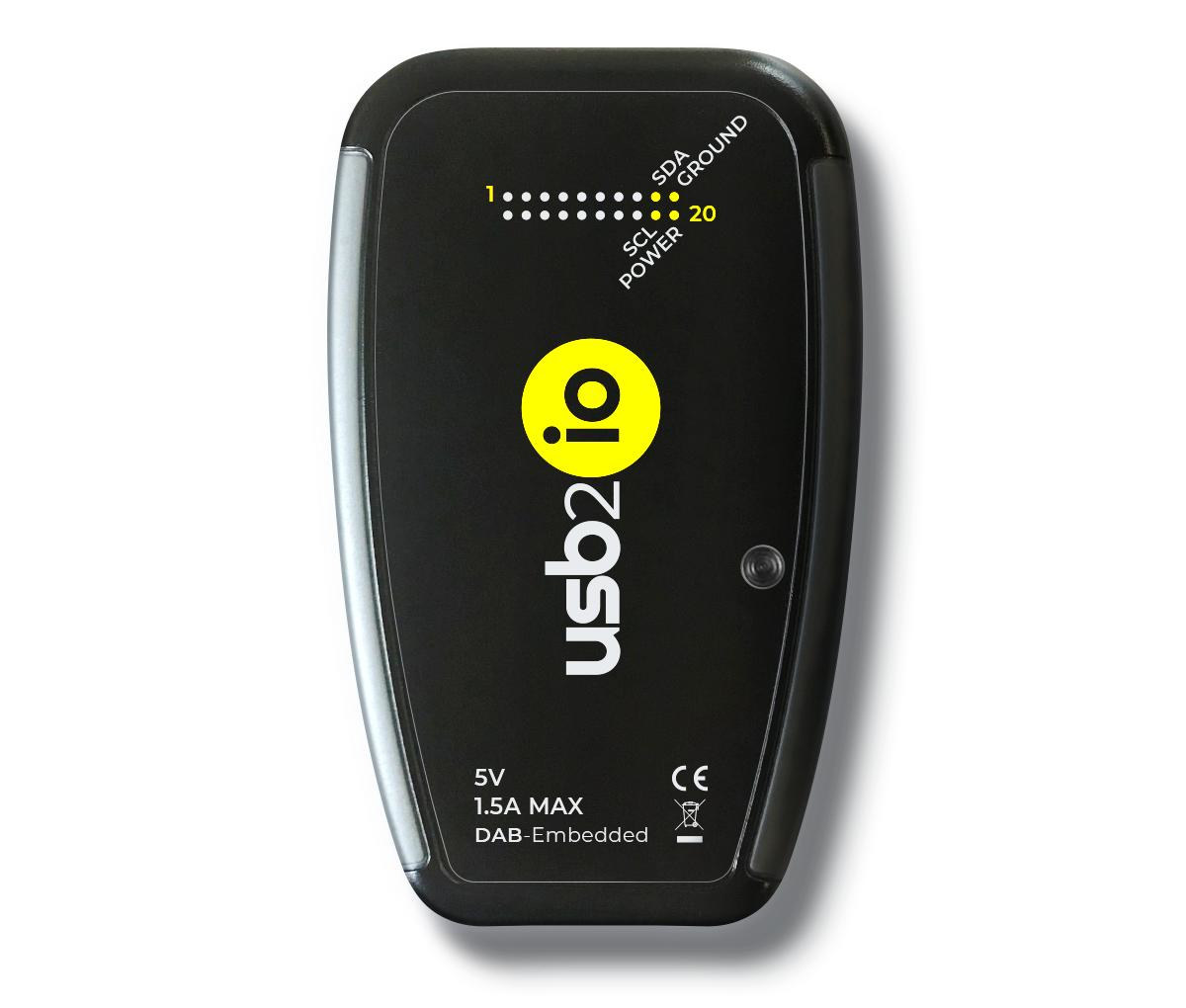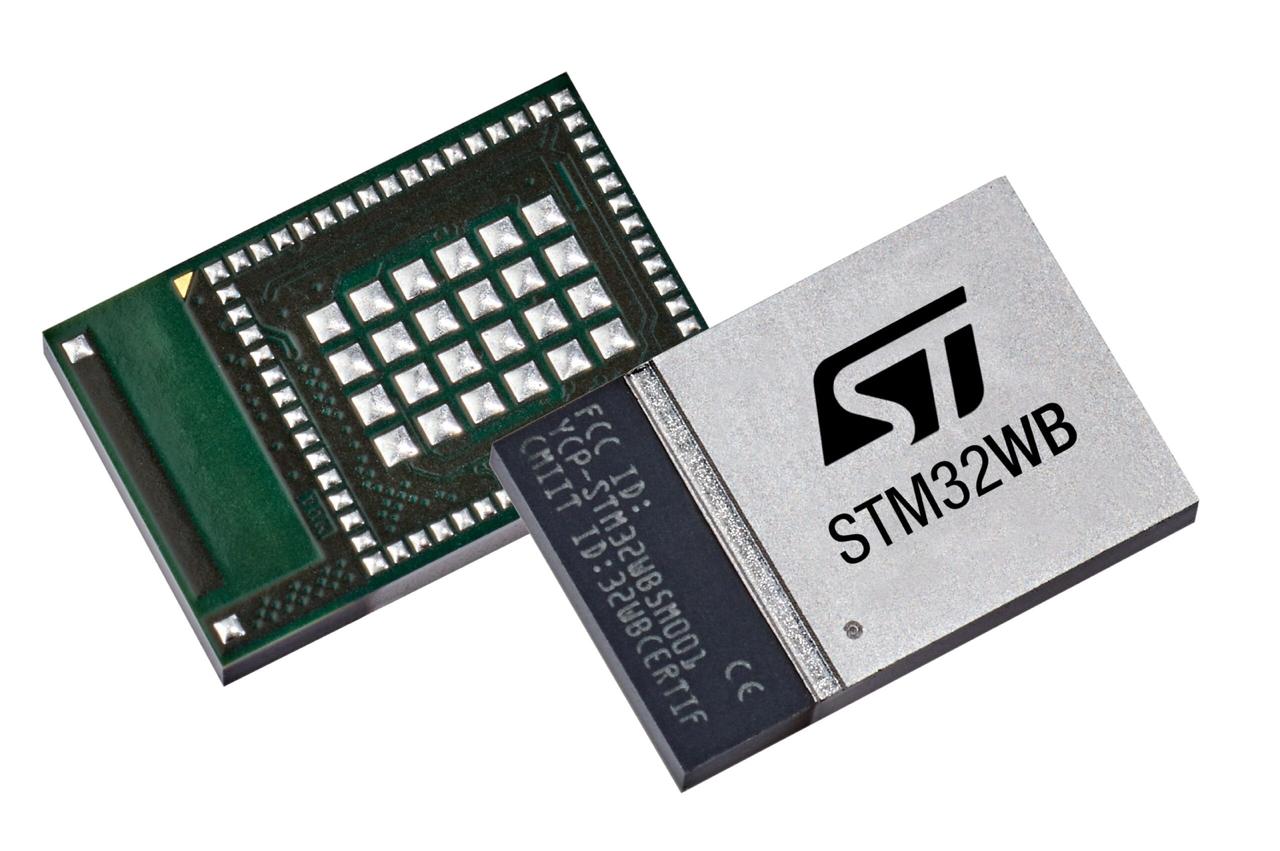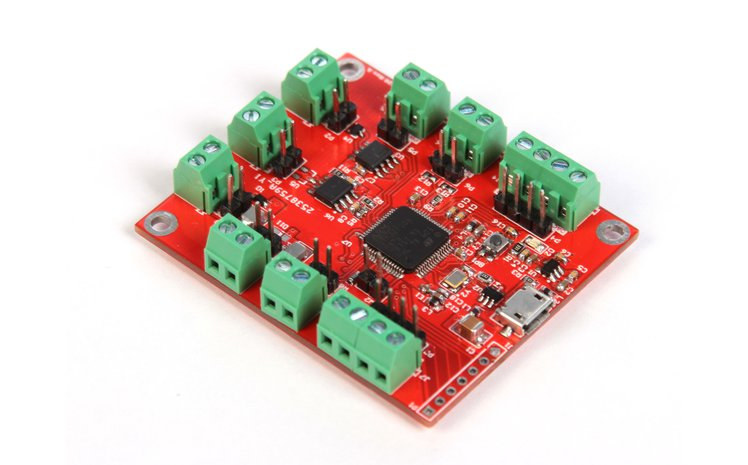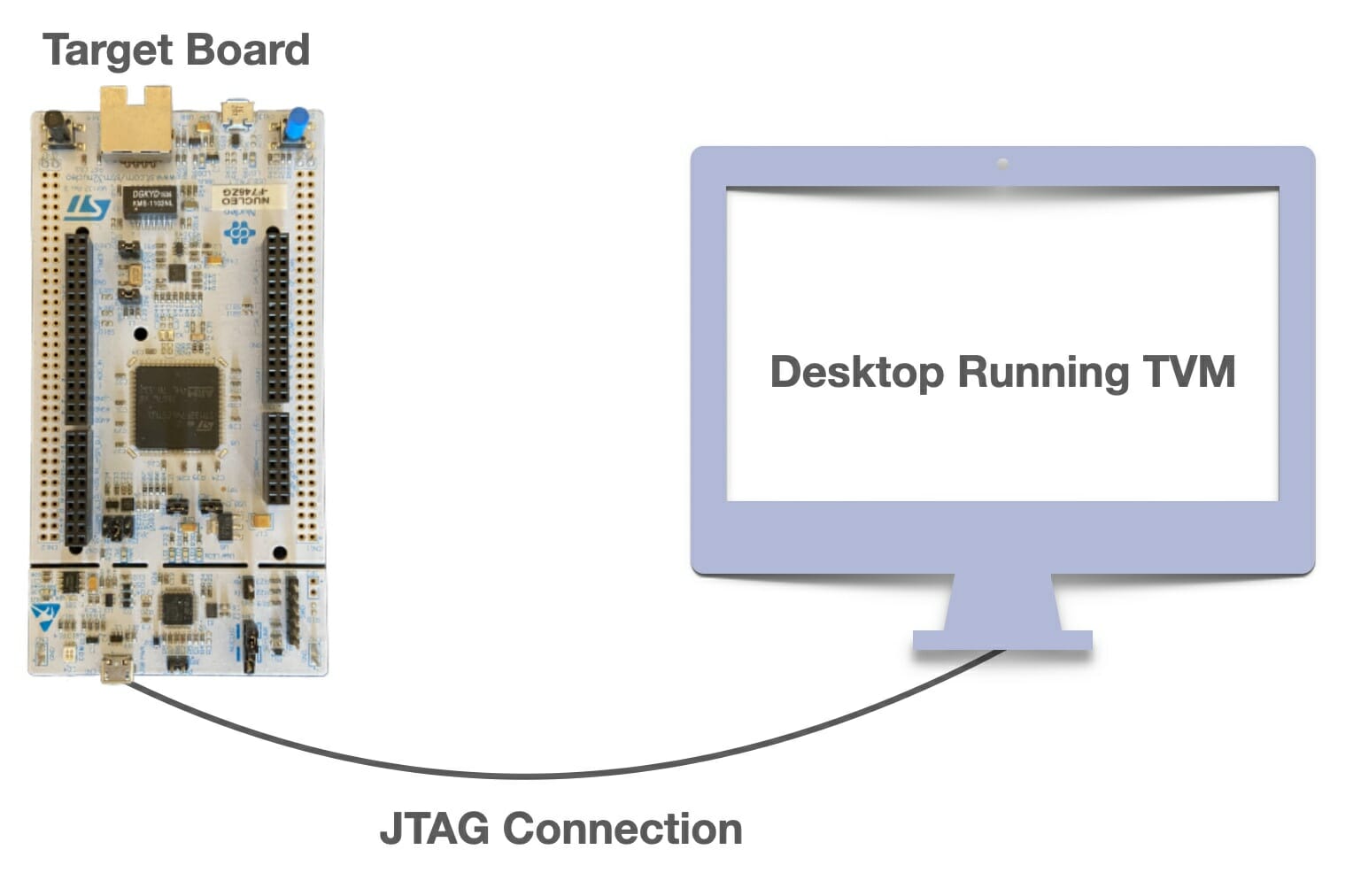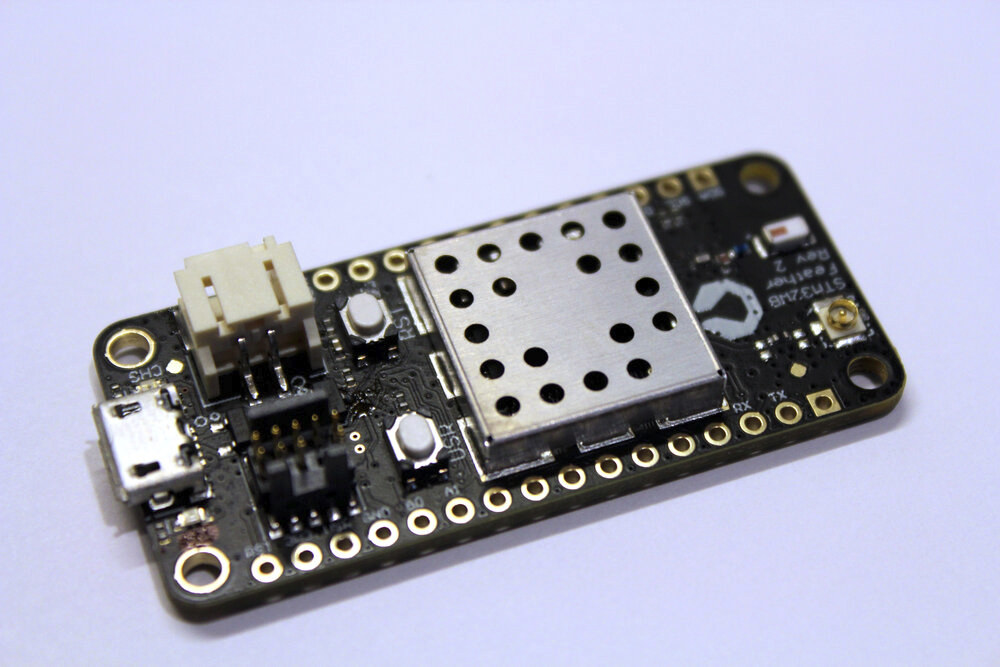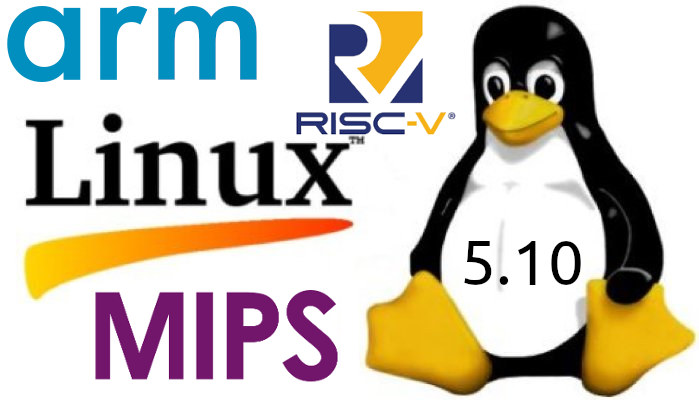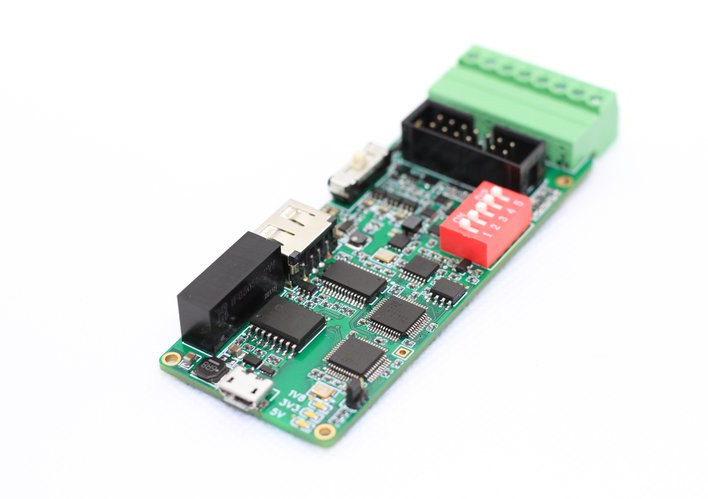In the second part of 2020, we’ve seen a fair amount of USB debugging tools for electronics designers and hardware hackers including the Glasgow Interface explorer with an ICE40 FPGA. But if you need even more flexibility or higher I/O speeds (up to 300 MHz), DAB Embedded USB2IO interface explorer should help thanks to the combination of an STMicro STM32H7 MCU and an Intel Cyclone 10 FPGA. USB2IO interface explorer hardware specifications: MCU – STMicro STM32H743 Arm Cortex-M7 @ 480MHz CPU clock An external 64MB QSPI flash for extra FPGA code storage; FPGA – Intel Cyclone 10LP (10CL040) with 40k logic elements, 1,134 Mbit embedded memory, 126 DSP blocks External memory – 32MB SDRAM for MCU and FPGA (64MB in total) Storage – 64MB QSPI for connected to MCU for FPGA code storage I/Os via 20-pin external header/connector 16 x GPIO mode (single-ended), 8x LVDS pair mode or a mix […]
MKR SharkyPro BLE, Zigbee, OpenThread development board follows Arduino MKR form factor
Just a few days ago, we mentioned STMicro launched STM32WB5MMG wireless module to simplify Bluetooth LE, Zigbee, OpenThread connectivity by allowing 2-layer baseboards for the module. It turns out there’s also such a module from a third-party with namely Midatronics SharkyPro module based on STM32WB55, and the company also launched MKR SharkyPro I & II development boards following Arduino MKR form factor. MKR SharkyPro specifications: Wireless Module – SharkyPro module Wireless MCU – STMicro STM32WB55CG/CE dual-core Arm Cortex-M4 core at 64 MHz (application processor) and Arm Cortex-M0+ core at 32 MHz (network processor) with 512KB flash, 256KB SRAM Connectivity – Bluetooth 5.0 LE, Bluetooth Mesh 1.0, OpenThread, Zigbee, and other IEEE 802.15.4 proprietary protocols Antenna – Onboard chip antenna (SharkyPro I) or SMA antenna connector (SharkyPro I) Power 3.3V supply voltage Consumption – 13 nA in shutdown mode, 600 nA in Standby mode + RTC + 32 KB RAM Dimensions […]
STM32WB5MMG Wireless Module simplifies Bluetooth LE, Zigbee, OpenThread connectivity
The STM32WB5MMG (STM32) is a wireless microcontroller module by STMicroelectronics. It is a compact ultra-low-power module that allows customers to design 2-layer PCBs and integrates everything up to the antenna, including an IPD (integrated passive device) for reliable antenna matching in order to reduce the overall costs. The STM32 wireless module is compatible with BLE (Bluetooth Low Energy) 5.0, OpenThread, Zigbee 3.0, dynamic and static concurrent modes, and 802.15.4 proprietary protocols. It also supports simultaneous dual-protocol mode that allows IEEE 802.15.4 radio-based protocols like Zigbee 3.0 and OpenThread for direct connection with any BLE device. Overview of STM32 Wireless Module The STM32 wireless module is a SiP-LGA86 package (System in Package Land Grid Array) with various external components including: STMicro STM32WB55 Cortex-M4/M0+ wireless MCU LSE crystal HSE crystal Passive components for SMPS Antenna matching and antenna IPD for RF matching and harmonics rejection Key Features of STM32 Wireless Module Dedicated […]
Protocol Droid is a USB bridge board to I2C, CAN Bus, RS485, UART, SPI, etc. (Crowdfunding)
We’ve seen some interesting USB hardware hacking/debugging boards in the last two months with Tigard, Ollie, and Glasgow Interface Explorer each with their own price point and features, but with the goal of replacing multiple other programming or debug boards you may need for your projects. Protocol Droid is another one of such USB boards for electronics designers and hardware hackers. It offers I/O connectivity via terminal blocks for I2C, CAN Bus, RS485, UART, SPI, and other interfaces. Protocol Droid key features and specifications: MCU – Unnamed STMicro microcontroller Host interface – Micro USB port Core Interfaces: I²C controller & peripheral modes SPI controller & peripheral modes RS485 controller & peripheral modes CAN Bus UART 2x PWM 2x ADC 2x DAC Debugging / programming interfaces – 7-pin JTAG/SWD unpopulated header Power Sources – 3V & 5V DC with limited current via 2-pin terminal blocks All interfaces are available simultaneously through […]
Use AutoTVM and uTVM to optimize ML workloads on embedded devices & microcontrollers
We are seeing a massive increase in resource-constraints for embedded devices due to a lack of mature software stacks. With the increase in open-source hardware, the available software support takes a considerable amount of time to develop AI/ML/DL applications. Some of the challenges faced today are that bare-metal devices do not have on-device memory management, and they do not have LLVM support. They are also hard to debug because of rigid programming and cross-compilation interfaces. Due to this, “optimizing and deploying machine learning workloads to bare-metal devices today is difficult”. To tackle these challenges, there have been developments to support TVM, an open-source machine learning compiler framework for CPUs, GPUs, and machine learning accelerators, on these bare-metal devices, and Apache TVM is running an open-source foundation to make this easy. “µTVM is a component of TVM that brings broad framework support, powerful compiler middleware, and flexible autotuning and compilation capabilities […]
STM32WB Feather board features STM32WB55 Bluetooth 5.0 SoC
STMicro announced the availability of their first wireless STM32 MCU last year with STM32WB55 Bluetooth 5.0 and 802.15.4 Cortex-M4/M0+ microcontroller together with P-NUCLEO-WB55 Development Pack. A company called Reclaimer Labs has now designed a Feather-compatible board with the wireless MCU, more specifically STM32WBCGU6, and simply called STM32WB Feather board. STM32WB Feather Board specifications: Wireless MCU – STMicro STM32WB55CG Bluetooth SoC with Arm Cortex-M4 application core, Arm Cortex-M0+ Bluetooth co-processor, 1 MB Flash storage, 256 KB of SRAM, USB ROM Bootloader Storage – 128 Mbit SPI NOR Flash memory Bluetooth antennas – On-board chip antenna, u.Fl connector for external antenna Expansion – 16-pin + 12-pin unpopulated headers with 6x analog input pins UART, I2C, SPI, and 7x GPIO pins Debugging – Standard SWD debug connector Misc – User button and LED, 32.768 kHz crystal for LSE/RTC Power Supply 5V via micro USB port 2-pin battery header, LiPo battery charger Dimensions – […]
Linux 5.10 LTS release – Main changes, Arm, MIPS and RISC-V architectures
Linus Torvalds has just released Linux 5.10: Ok, here it is – 5.10 is tagged and pushed out. I pretty much always wish that the last week was even calmer than it was, and that’s true here too. There’s a fair amount of fixes in here, including a few last-minute reverts for things that didn’t get fixed, but nothing makes me go “we need another week”. Things look fairly normal. It’s mostly drivers – as it should be – with a smattering of fixes all over: networking, architectures, filesystems, tooling.. The shortlog is appended, and scanning it gives a good idea of what kind of things are there. Nothing that looks scary: most of the patches are very small, and the biggest one is fixing pin mapping definitions for a pincontrol driver. This also obviously means that the merge window for 5.11 will start tomorrow. I already have a couple […]
Ollie USB board exposes isolated UART, CAN, USB, RS485 & RS232 interfaces (crowdfunding)
Just like months, we wrote about Tigard open-source USB FT2232H board for hardware hacking with easy access to OpenOCD, JTAG, Cortex, flashrom interfaces used to debug/flash boards, extra I/Os with UART, SPI, and I2C, as well as a header to connect a logic analyzer and observe signals. If the board does not exactly match your requirements, Ollie USB board might, also it may not serve exactly the same purpose(s). The board acts as a USB bridge to isolated UART (x2), CAN, USB, RS485, and RS232 interfaces. Ollie specifications: MCU – STMicro STM32F042 Arm Cortex-M0 microcontroller with CAN interface Host interface – Micro USB port Isolated interfaces (all with ESD protection) 2x UART ports up to 12 Mbps with 1.8/3.3/5 V voltage levels (set by slide switch) CAN bus based on CANable/CANtact open hardware, flashed with dual firmware CANtact and Candlelight (switch selectable) and equipped with termination resistor switch Downstream USB […]


